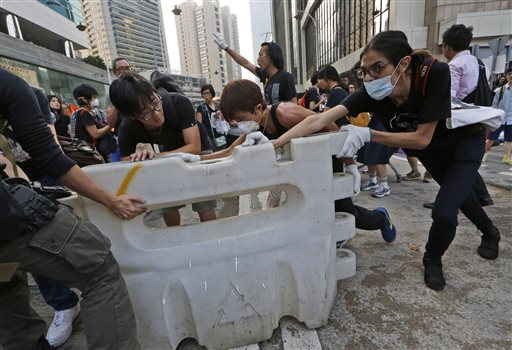
Pro-democracy protesters build a barricade on the main road in the occupied areas outside the government headquarters in Hong Kong’s Admiralty, Monday, Oct. 13, 2014. Officers took away unmanned metal barricades at the edges of the city’s Central financial district early Monday, ahead of the rush hour. AP PHOTO/KIN CHEUNG
HONG KONG–Dozens of masked men rushed barricades at Hong Kong’s main pro-democracy site on Monday, sparking renewed accusations that authorities are using hired thugs to disperse demonstrators.
Groups of men, many wearing surgical masks, descended on the front lines of the rally at Admiralty near the city’s central business district, triggering clashes with protesters after police had moved in to take down some barriers.
Demonstrators, who have come under attack from organized crime gangs known as triads at another flashpoint demonstration site in Mongkok, shouted: “Weapons! Weapons!” and “Arrest the triads” as police struggled to impose order.
Despite repeated orders to disperse, rallies now into their third week have taken on an air of permanence, with tents, portable showers and lecture venues springing up in recent days.
Pro-democracy lawmakers who back demonstrators’ calls for Beijing to grant the right to direct elections in the former British colony were quick to round on the authorities.
“This is one of the tactics used by the communists in mainland China from time to time. They use triads or pro-government mobs to try to attack you so the government will not have to assume responsibility,” Democratic Party lawmaker Albert Ho told AFP.
“It seems that the police have duly removed some of the barricades to make way for the suspected triads to get through to the peaceful protesters,” Civic Party lawmaker Claudia Mo told AFP.
Taxi drivers had also converged on the site with their cars, demanding the barricades be removed and other anti-Occupy groups chanted “Occupy is illegal.”
Anti-Occupy protesters mainly dissipated as the day wore on, while pro-democracy demonstrators set about reinforcing their positions in case the police return for a second dawn raid on Tuesday.
In Admiralty activists laid down cement foundations and built up bamboo pole barricades blocking both lanes of a highway, using everything from steel chains to plastic ties and sticky tape to strengthen the structures, even enlisting sympathetic construction workers for help with their building work.
“The construction workers taught us how to build the grids and tie the poles together so it’s strong. We’ve been working on it for hours,” said John Lam, 26.
One of the workers, who gave his name only as Sing because he was nervous of retribution from his company, said he volunteered to help the students because he was angry at police for using tear gas on protesters last month.
“A group of us organized today to buy bamboo and erect barricades to protect the students. I will come back tomorrow and keep doing what I can to help,” the 27-year-old said.
Protesters also filled plastic barricades with water, making them difficult to move, after police warned Monday they would move to clear more “obstacles” from the protest sites.
“We will not eliminate the possibility of using minimal force or arrest actions,” police senior superintendent Hui Chun-tak told reporters.
He said that three men had been arrested during the earlier scuffles, one for assault and two for carrying offensive weapons.
Triad allegations
Parts of Hong Kong have been at a standstill over the last fortnight, prompting clashes with elements who oppose the blockades and widespread disruption to businesses and travel.
It was the second time since the mass protests began that authorities had been accused of cooperating with criminal gangs.
In previous clashes at the secondary site of Mongkok 10 days ago, police said eight of the 19 arrested had triad backgrounds.
Furious pro-democracy protesters also accused the authorities of using thugs Monday.
“The government wants Hong Kong people to fight each other, that’s how they want to win,” protester Angela Li said.
“All the people using violence and causing trouble are paid thugs.”
Police said that the clashes were due to “people unlawfully blocking the roads with obstacles.”
Earlier Hong Kong’s embattled leader Leung Chun-ying had told reporters in the Chinese city of Guangzhou that he wanted the protests to end.
“Under the appropriate situation we hope to allow society to return to normal as quickly as possible,” he said on the sidelines of a trade meeting.
‘Zero chance’ of success
On Sunday, Chief Executive Leung had said the protesters had “almost zero chance” of changing Beijing’s stance and securing free elections.
China announced in August that while Hong Kongers will be able to vote for Leung’s successor in 2017, only two or three vetted candidates will be allowed to stand–an arrangement the protesters dismiss as “fake democracy.”
Students and pro-democracy campaigners have taken to the streets–sometimes in their tens of thousands– since last month to call for Beijing to change its position and to demand Leung’s resignation.
Talks between student leaders and city officials collapsed last week, deepening the crisis in the semi-autonomous city.
China has in recent weeks held around 40 people on the mainland who had expressed support for the protests in Hong Kong, according to rights groups.–With a report from AP